THOMAS MEDVETZ is assistant professor of sociology at the University of California, San Diego.
The University of Chicago Press, Chicago 60637
The University of Chicago Press, Ltd., London
2012 by The University of Chicago
All rights reserved. Published 2012.
Printed in the United States of America
21 20 19 18 17 16 15 14 13 12 1 2 3 4 5
ISBN-13: 978-0-226-51729-2 (cloth)
ISBN-13: 978-0-226-51730-8 (electronic)
ISBN-10: 0-226-51729-2 (cloth)
ISBN-10: 0-226-51730-6 (electronic)
Library of Congress Cataloging-in-Publication Data
Medvetz, Thomas.
Think tanks in America / Thomas Medvetz.
pages ; cm
Includes bibliographical references and index.
ISBN-13: 978-0-226-51729-2 (cloth : alkaline paper)
ISBN-10: 0-226-51729-2 (cloth : alkaline paper)
ISBN-13: 978-0-226-51730-8 (e-book)
ISBN-10: 0-226-51730-6 (e-book) 1. Government consultantsUnited States. 2. Research institutesUnited States. 3. Policy sciencesUnited States. 4. Political planningUnited States. I. Title.
JK468.C7M43 2012
320.60973dc23
2012014464

This paper meets the requirements of ANSI/NISO Z39.48-1992 (Permanence of Paper).
Think Tanks in America
THOMAS MEDVETZ
THE UNIVERSITY OF CHICAGO PRESS
CHICAGO AND LONDON
FOR MY PARENTS, THEODORE AND RITA MEDVETZ
Contents
Acknowledgments
This book could not have been written without the help of numerous mentors, colleagues, friends, and family members. First and foremost, I would like to thank Loc Wacquant for his generous intellectual guidance and moral support. Both through direct instruction and by example, Loc has enriched my understanding of the sociological craft in ways that I can hardly begin to articulate. My sincere appreciation also goes to Jerome Karabel, who supervised the thesis on which this book is based, and to Gil Eyal and George Lakoff, who offered valuable feedback as members of my dissertation committee. Gil likewise read and commented on an early draft of the book. At Berkeley, many talented teachers and peers shaped my thinking in important ways, including Emily Beller, Michael Burawoy, Ryan Centner, Anthony Chen, Malcolm Fairbrother, Claude Fischer, Neil Fligstein, Marion Fourcade, Mike Hout, Isaac Martin, Stephanie Mudge, Fareen Parvez, Erndira Rueda, Jeff Sallaz, Ofer Sharone, Lisa Stampnitzky, Ann Swidler, Robb Willer, and Pete Younkin.
From 2007 to 2008, I spent a luxurious year as a postdoctoral fellow at Cornell Universitys Institute for the Social Sciences. My thanks to Ron Herring, Kenneth Roberts, Rebecca Givan, Kyoko Sato, Sarah Soule, Susan Spronk, and the other members of the Contentious Knowledge team for their collegiality and intellectual camaraderie. I wrote the final version of this book at the University of California, San Diego surrounded by a vibrant community of scholars in the Sociology Department. Among them, Amy Binder, John Evans, Isaac Martin, and John Skrentny deserve special recognition for reading portions of the text and offering useful advice. I would also like to thank Andrew Cheyne, Charlotte Goor, and Timothy Young for their superb research assistance during the projects closing phases. Finally, UCSD Geographic Information System coordinator Tracey Hughes supplied the technical prowess needed to construct .
Several institutions provided material support for this research, including the Social Science Research Council; the National Science Foundation; the Phi Beta Kappa Society; the University of California, Berkeley Graduate Division; the University of California, San Diego; and the Hellman Fellows fund. I owe a major debt of gratitude also to the members of the Washington, DC, and New York policy circles who gave generously of their time and effort to help with the research, especially my interviewees. Among them, I would like to thank Karlyn Bowman at the American Enterprise Institute, Steve Clemons at the New America Foundation, Grover Norquist at the Americans for Tax Reform, Bruce Stokes of the National Journal, and Fred Smith Jr. at the Competitive Enterprise Institute for sharing their thoughts and experiences. Several archivists also assisted in the data collection process, including Kathleen Higgs at the Carnegie Endowment for International Peace, Eric Eisinger and Sarah Chilton at the Brookings Institution, and Gene Hosey at the American Enterprise Institute.
It has been a tremendous honor to work with the University of Chicago Press, especially my editor Doug Mitchell, whose impeccable reputation preceded him but still failed to do him justice. (A compilation of Dougs witty emails would make a compelling book of its own.) Three anonymous University of Chicago Press reviewers offered constructive and encouraging feedback on the original manuscript. My thanks also to Mary Corrado for her skillful and patient editorial assistance, and to Tim McGovern, Isaac Tobin, Ben Balskus, and Jeff Waxman for seeing the book through various stages of its production.
Over the years I spent working on this project, Ive been fortunate to receive advice and encouragement from many colleagues in the social sciences, including Sarah Babb, Craig Calhoun, Neil Gross, Katherine McClelland, and Richard Swedberg. I would also like to thank Emily Hoagland, Marissa Laham, Caroline Lee, Mike McQuarrie, and Peter OGrady for their friendship and intellectual guidance. Finally, I owe my deepest gratitude to my parents, Theodore and Rita Medvetz, whose unfailing love and support made everything else possible.
T. M. M.
La Jolla, California
January 2012
Abbreviations
ADC Aid to Dependent Children
AEA American Enterprise Association
AEI American Enterprise Institute for Public Policy Research
AFDC Aid to Families with Dependent Children
AIR American Institutes for Research
ASSA American Social Science Association
CAP Center for American Progress
CASBS Center for Advanced Study in the Behavioral Sciences
CBPP Center on Budget and Policy Priorities
CCF Chicago Civic Federation
CEA Council of Economic Advisers
CED Committee for Economic Development
CEI Competitive Enterprise Institute
CEIP Carnegie Endowment for International Peace
CFR Council on Foreign Relations
CNAS Center for a New American Security
CSIS Center for Strategic and International Studies
DLC Democratic Leadership Council
EPI Economic Policy Institute
FEE Foundation for Economic Education
FPA Foreign Policy Association
HEW Department of Health, Education, and Welfare
HUD Department of Housing and Urban Development
IFRI Institut Franais des Relations Internationales (French Institute for International Relations)
IGR Institute for Government Research
IIE Peterson Institute for International Economics
IPR Institute of Pacific Relations
IPS Institute for Policy Studies
JCPES Joint Center for Political and Economic Studies
JOBS Job Opportunity and Basic Skills Training Program
NAF New American Foundation
NBER National Bureau of Economic Research
NCF National Civic Federation
NCPA National Center for Policy Analysis
NIRA National Institute for Research Advancement
NYBMR New York Bureau of Municipal Research

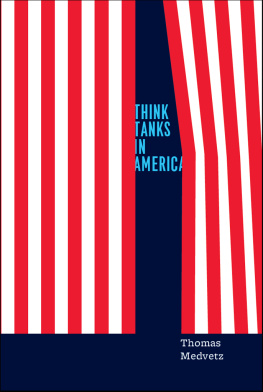
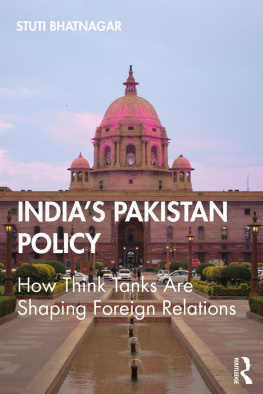
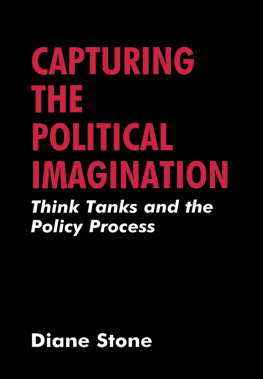
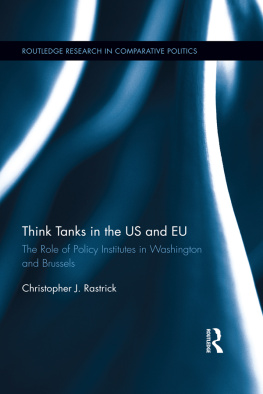





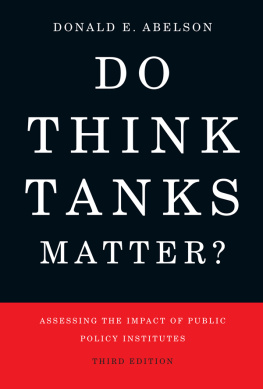



 This paper meets the requirements of ANSI/NISO Z39.48-1992 (Permanence of Paper).
This paper meets the requirements of ANSI/NISO Z39.48-1992 (Permanence of Paper).